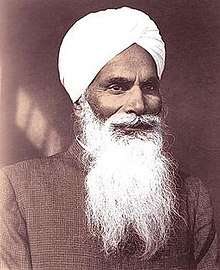Jagat Singh (Sant)
Born into a prosperous Sikh farming family in the Punjab of India, Jagat Singh (1884-1951) became a Surat Shabd Yoga practitioner and initiate of the Sant and Radha Soami Satguru Sawan Singh. He worked as a college chemistry professor at an Agricultural College[1] and was honoured for meritorious service by the British as Sardar Bahadur Jagat Singh. After retirement he was chosen by his spiritual Master to be his successor, becoming the third Guru of Radha Soami Satsang Beas. Remembered as quiet, inconspicuous, and unassuming, he was once described by the Muslim mystic Sain Baba Lasoori Shah of Lyallpur as a "perfect disciple" who became a "perfect Master".[2][3]
Sardar Bahadur Jagat Singh | |
|---|---|
 | |
| Personal | |
| Born | 27 July 1884 Suranussi, Jalandhar, Punjab |
| Died | 23 October 1951 (aged 67) Beas, Punjab |
| Religion | Sikhism, Sant Mat, Radha Soami |
| Senior posting | |
| Based in | Punjab |
| Period in office | 1948 - 1951 |
| Predecessor | Baba Sawan Singh |
| Successor | Baba Charan Singh |
| Website | rssb.org |
Background
Jagat Singh Klair was born on 27 July 1884 into a family of prosperous and religious Jat Sikh farmers[4], in the small village of Suranussi in the Jalandhar District of the Punjab, India. His mother Bibi Daya Kaur died when he was five years old. He was raised by his stepmother Bibi Rukmani Kaur. He received his initial education in the Christian Mission School at Jalandhar. He then passed his M.Sc. degree in Chemistry at the Government College of Lahore.[5] He joined the Punjab Agricultural College, Lyallpur, in 1911 as Assistant Professor of Chemistry and retired as Vice Principal of the institution in 1943 receiving the title Sardar Bahadur for his thirty-two years of meritorious service.[6][7]
Spiritual path
In Abbotabad on 28 December 1910 at the age of twenty-six, he was initiated into the meditation practice of Surat Shabd Yoga (also known as Nam Bhakti) by Hazur Maharaj Sawan Singh. He had gone there with his cousin Sardar Bhagat Singh and the Judge Rai Sahib Munshi Ram to hear his future guru, who was still in service there, deliver satsang. Throughout his own career as a college professor he made it a point to spend most of his weekends with his guru Hazur Maharaj Sawan Singh at the Dera and to spend most of his time in the Surat Shabd Yoga meditation practice. After his retirement in 1943, he lived permanently at Dera Baba Jaimal Singh.[8]
Demise
He died on the morning of 23 October 1951. Before he died he appointed Sardar Charan Singh as his spiritual successor in a written will.
References on his life and teachings
- Jagat Singh, Discourses on Sant Mat, volume 2. Compiled translated talks. ISBN 81-8256-710-6
- Jagat Singh, Science of the Soul, Beas: Radha Soami Satsang Beas. Compiled translated excerpts from talks and letters. ISBN 978-81-8256-914-0
- Kapur, Daryai Lal, Heaven on Earth, Beas: Radha Soami Satsang Beas, 1986. Historical narrative. ISBN 978-81-8256-122-9
- Munshi Ram, With the Three Masters, volume 2 (ISBN 81-8256-501-4) and volume 3 (ISBN 81-8256-502-2), Beas: Radha Soami Satsang Beas. Diary excerpts.
- In the Footsteps of the Master. Biographical photograph album. Radha Soami Satsang Beas, 1993.
Notes
- Radhasoami Reality: the logic of a modern faith by Mark Juergensmeyer. p.51. Princeton University Press, 1991
- Discourse on Sardar Bahadur Jagat Singh by Air Vice Marshal Kundan Sondhi. R.S.Greetings periodical April 1971, pp.26-40. RS Satsang USA
- Heaven on Earth by Daryai Lal Lal Kapur. p.236. RS Satsang Beas, 1986
- In the footsteps of the Master, p.3. RS Satsang Beas, 1993
- In the footsteps of the Master. p.3. RS Satsang Beas, 1993
- Heaven on Earth by Daryai Lal Lal Kapur. p.244. RS Satsang Beas, 1986
- The science of the soul by Maharaj Sardar Bahadur Jagat Singh. p.vii. Radha Soami Satsang Beas, 1959
- Heaven on Earth by Daryai Lal Lal Kapur. p.229. RS Satsang Beas, 1986